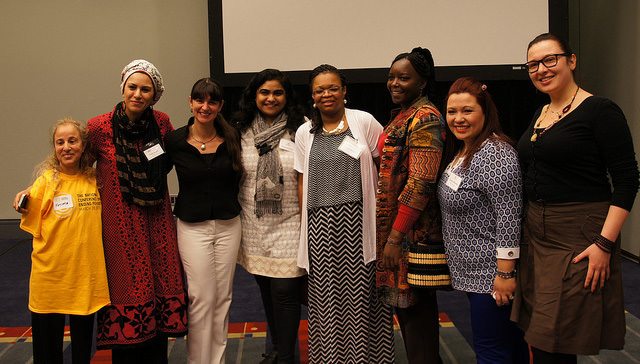More than 800 people from across the nation gathered at the Washington Convention Center on March 28 for the fourth annual National Conference on Ending Poverty. Speeches, demonstrations and testimonies were shared in an effort to inspire change and raise public awareness about homelessness and poverty.
“Justice! Not charity! Is that too much to ask?” shouted keynote speaker Peter Edelman, a professor at Georgetown University and author of “So Rich, So Poor: Why It’s So Hard to End Poverty in America.”
District nonprofit A Wider Circle organized and hosted the conference. According to Founder and Executive Director Mike Bergel, this year’s attendance was double that of 2014.
“There was a lot of experience when you add the people in the room together,” Bergel said. “This is what we think needs to happen to get people out of poverty.”
Bergel stressed the importance of connecting people living in poverty to those who want to help end it. He could not give a specific percentage of attendees at the conference who were living in poverty, but said the number was larger than last year.
“It’s important to acknowledge those experiencing poverty and food insecurity; they’re the experts,” said Jenna Umbriac, Director of Nutrition Programs for Manna Food Center.
Based in Montgomery County, Maryland, Manna provides donated and “rescued” food to area residents. Some of the center’s staff attended the conference to learn more community-building strategies and to be inspired.
“Sometimes it feels like we’re doing it alone,” Umbriac said. “If we could harness the power of those people [who are living in poverty], something can change.”
Manna occupied one of many booths lining the conference hall walls and presented a workshop about food insecurity and community building.
For some, the conference fell short. Nancy Scull, who recently retired as coordinator of the Family Self-Sufficiency program at the Montgomery Housing Public Agency, said the range of policymakers that spoke at the event was too narrow. Of the eight government officials who spoke at the event, seven were from Montgomery County. The eighth executive was D.C. At-Large City Councilmember Vincent Orange.
“I don’t feel negatively that elected officials didn’t come,” Bergel said. “I completely understand their schedules, and it’s my jobs to make it more appealing for them to come.”
Bergel wants to focus on getting more people, elected officials included, to attend the conference next year.
“I believe that all of us have to engage,” he said. “I want to have more of everybody there.”
Scull said she felt those who organized the conference should have been more concerned with elected officials’ attendance at the event.
“There should have been a mix of senators as far and wide as they could go on those panels so that people know what is going on across the country,” Scull said.
Scull met with employees at A Wider Circle several weeks before the conference to consult on organizing. At that point A Wider Circle had not reached out to many government officials. Scull hurried to invite over 150 members of congress, and requested legislative aids be sent in their stead if necessary.
A Wider Circle received the emails, but staff are unsure if any congresspersons or legislative aides attended the conference, Bergel said. The conference was very hectic and Bergel could not give the number of government officials who attended the event, he said.
Advocacy organizations in the region need to place greater emphasis on working with politicians to alleviate poverty throughout the country, according to Scull.
Fighting Poverty Through Empowerment
Many of the conference workshops focused on self-empowerment and ending the cycle of poverty through employment opportunities. Four Empowered Women International (EWI) members sat on a panel during their workshop and discussed the misconceptions of poverty.
EWI works with women that are overcoming difficult life circumstances. Over 50 percent of their clients are foreign-born. EWI also provides a year-long Entrepreneur Fellowship that trains business-savvy women and helps them get their businesses off the ground.
“Most people assume that poor people are just waiting for handouts,” Pauline Muchina, an EWI Entrepreneur Fellowship student said. “That’s the worst way to deal with poverty…You need to train people and invest in them so they can do if for themselves.”
Karamchandani immigrated from India to the U.S after 9/11, and racial tensions made it difficult for her to find a job. She was recently married and did not feel equipped to handle her new life in a new country.
“People need to know that poverty isn’t about money, it’s about lack of control,” Karamchandani said. “Each person needs to recognize where the lack comes from, [and then] we need to teach them how to fend for themselves.”
One attendee recalled creating a strict budget that left her only $12 for groceries per month. She cut back on her expenses in order to avoid going into debt and is now an art and entrepreneurship educator.
The conference also included “reverse panels,” where audience members spoke to experts. One reverse panel was titled “Where do we go from here?”
A microphone was set up at the front of the room and audience members shared their personal goals to help end poverty, such as reaching out to diverse communities for their input on poverty and raising money through car washes.
“You’ve got to create relationships between income levels,” said reverse panel leader Scott Miller, Founder and CEO of CirclesUSA.
Miller focused on “right-sized strategies” for each individual and asked each audience member to reflect on whether their goal was an appropriate response to poverty. Bergel wants to do even more next year to leave participants excited and able to take action, including a march to end poverty along with the conference.
“This was not as big as I wanted it to be,” Bergel said. “I want to pump more urgency into it.”








